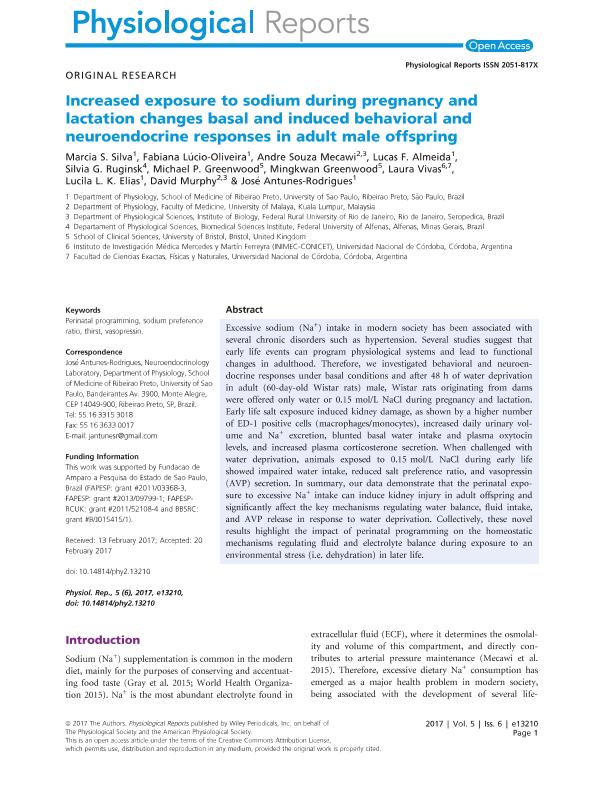Mostrar el registro sencillo del ítem
dc.contributor.author
Silva, Marcia S.
dc.contributor.author
Lúcio Oliveira, Fabiana
dc.contributor.author
Mecawi, Andre Souza
dc.contributor.author
Almeida, Lucas F.
dc.contributor.author
Ruginsk, Silvia G.
dc.contributor.author
Greenwood, Michael P.
dc.contributor.author
Greenwood, Mingkwan
dc.contributor.author
Vivas, Laura Marta

dc.contributor.author
Elias, Lucila L. K.
dc.contributor.author
Murphy, David
dc.contributor.author
Antunes Rodrigues, José
dc.date.available
2018-11-09T13:20:10Z
dc.date.issued
2017-03-29
dc.identifier.citation
Silva, Marcia S.; Lúcio Oliveira, Fabiana; Mecawi, Andre Souza; Almeida, Lucas F.; Ruginsk, Silvia G.; et al.; Increased exposure to sodium during pregnancy and lactation changes basal and induced behavioral and neuroendocrine responses in adult male offspring; American Physiological Society; Physiological Reports; 5; 6; 29-3-2017; 1-13
dc.identifier.issn
2051-817X
dc.identifier.uri
http://hdl.handle.net/11336/64054
dc.description.abstract
Excessive sodium (Na+) intake in modern society has been associated with several chronic disorders such as hypertension. Several studies suggest that early life events can program physiological systems and lead to functional changes in adulthood. Therefore, we investigated behavioral and neuroendocrine responses under basal conditions and after 48 h of water deprivation in adult (60-day-old Wistar rats) male, Wistar rats originating from dams were offered only water or 0.15 mol/L NaCl during pregnancy and lactation. Early life salt exposure induced kidney damage, as shown by a higher number of ED-1 positive cells (macrophages/monocytes), increased daily urinary volume and Na+ excretion, blunted basal water intake and plasma oxytocin levels, and increased plasma corticosterone secretion. When challenged with water deprivation, animals exposed to 0.15 mol/L NaCl during early life showed impaired water intake, reduced salt preference ratio, and vasopressin (AVP) secretion. In summary, our data demonstrate that the perinatal exposure to excessive Na+ intake can induce kidney injury in adult offspring and significantly affect the key mechanisms regulating water balance, fluid intake, and AVP release in response to water deprivation. Collectively, these novel results highlight the impact of perinatal programming on the homeostatic mechanisms regulating fluid and electrolyte balance during exposure to an environmental stress (i.e. dehydration) in later life.
dc.format
application/pdf
dc.language.iso
eng
dc.publisher
American Physiological Society

dc.rights
info:eu-repo/semantics/openAccess
dc.rights.uri
https://creativecommons.org/licenses/by-nc-sa/2.5/ar/
dc.subject
Perinatal Programming
dc.subject
Sodium Preference Ratio
dc.subject
Thirst
dc.subject
Vasopressin
dc.subject.classification
Inmunología

dc.subject.classification
Medicina Básica

dc.subject.classification
CIENCIAS MÉDICAS Y DE LA SALUD

dc.title
Increased exposure to sodium during pregnancy and lactation changes basal and induced behavioral and neuroendocrine responses in adult male offspring
dc.type
info:eu-repo/semantics/article
dc.type
info:ar-repo/semantics/artículo
dc.type
info:eu-repo/semantics/publishedVersion
dc.date.updated
2018-10-22T15:50:37Z
dc.journal.volume
5
dc.journal.number
6
dc.journal.pagination
1-13
dc.journal.pais
Estados Unidos

dc.journal.ciudad
Hoboken
dc.description.fil
Fil: Silva, Marcia S.. Universidade de Sao Paulo; Brasil
dc.description.fil
Fil: Lúcio Oliveira, Fabiana. Universidade de Sao Paulo; Brasil
dc.description.fil
Fil: Mecawi, Andre Souza. University of Malaya; Malasia
dc.description.fil
Fil: Almeida, Lucas F.. Universidade de Sao Paulo; Brasil. Universidade Federal Rural do Rio de Janeiro; Brasil
dc.description.fil
Fil: Ruginsk, Silvia G.. Federal University of Alfenas; Brasil
dc.description.fil
Fil: Greenwood, Michael P.. University of Bristol; Reino Unido
dc.description.fil
Fil: Greenwood, Mingkwan. University of Bristol; Reino Unido
dc.description.fil
Fil: Vivas, Laura Marta. Consejo Nacional de Investigaciones Científicas y Técnicas. Centro Científico Tecnológico Conicet - Córdoba. Instituto de Investigación Médica Mercedes y Martín Ferreyra. Universidad Nacional de Córdoba. Instituto de Investigación Médica Mercedes y Martín Ferreyra; Argentina. Universidad Nacional de Córdoba. Facultad de Ciencias Exactas, Físicas y Naturales; Argentina
dc.description.fil
Fil: Elias, Lucila L. K.. Universidade de Sao Paulo; Brasil
dc.description.fil
Fil: Murphy, David. Universidade de Sao Paulo; Brasil. Universidade Federal Rural do Rio de Janeiro; Brasil
dc.description.fil
Fil: Antunes Rodrigues, José. Universidade de Sao Paulo; Brasil
dc.journal.title
Physiological Reports
dc.relation.alternativeid
info:eu-repo/semantics/altIdentifier/doi/https://dx.doi.org/10.14814/phy2.13210
dc.relation.alternativeid
info:eu-repo/semantics/altIdentifier/url/https://physoc.onlinelibrary.wiley.com/doi/full/10.14814/phy2.13210
Archivos asociados
